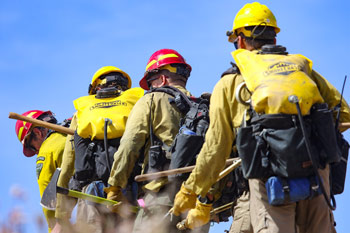Click Here for California Fires
September 6, 2024 - Significant wildland fire activity is once again increasing in multiple Geographic Areas with a high potential for additional large wildland fires to emerge over the next several days.  All National Resources are heavily committed and the National Interagency Coordination Center is coordinating National Resource requests with Geographic Area Coordination Centers who are below draw-down levels for multiple resource types. Active Geographic Areas are intensively engaged in prioritization of incidents and reallocation of resources as needed to ensure effective incident operations. Due to these factors, the National Preparedness Level has increased to 5 (PL 5) as of 0730 MDT this morning.
All National Resources are heavily committed and the National Interagency Coordination Center is coordinating National Resource requests with Geographic Area Coordination Centers who are below draw-down levels for multiple resource types. Active Geographic Areas are intensively engaged in prioritization of incidents and reallocation of resources as needed to ensure effective incident operations. Due to these factors, the National Preparedness Level has increased to 5 (PL 5) as of 0730 MDT this morning.
Nearly 20,000 wildland firefighters and support personnel continue to work on new wildfires ignited by lightning storms across the West. As of this morning, 67 large active wildfires are being managed with full suppression strategies. Current wildfires have burned 1,981,105 acres. Resources assigned to incidents include 25 complex and three type 1 incident management teams, 451 crews, 1,012 engines, and 120 helicopters.
Sixty fireline management personnel from Australia and New Zealand are assigned to support large fires in the Northwest Area. For more information about the mobilization of wildland firefighters from Australia and New Zealand visit the international support page.
Two hundred forty-five soldiers from the 14th Brigade Engineer Battalion and the 1st Battalion, 17th Infantry Regiment based out of Joint Base Lewis McChord (JBLM) are deployed in support of wildland fire operations on the Boise National Forest. NIMO (Team 2) is assigned to support the military contingent. To learn more about military mobilizations, visit the military support page.
Note: Given the very high tempo and scale of national fire activity over the past few months, there have been delays in reconciling actual acreage burned with entries into the reporting systems, especially from areas with large fires and dynamic fire activity. Adjustments are occurring as the accuracy of fire locations, mapping and final fire reporting is reconciled.
The upper-level ridge will strengthen over the West, with temperatures as much as 20 degrees above normal and numerous daily records possible from Arizona and California to the Pacific Northwest. Temperatures up to 110°F are expected in the California Central Valley, and near or exceeding 100°F in the Willamette Valley of Oregon. Well above normal temperatures will spread east to the Continental Divide, as well. Very low minimum RH of 4-20% will spread across the West, west of the Divide, with poor overnight recovery of 10-30% for mid- slopes and ridges focused on the Great Basin, Northwest, California, and Arizona. Winds overall will be light, but locally gust easterly winds of 10-15 mph will occur in the Columbia Gorge and the northern Wasatch Front. Significant fire potential will remain low to moderate due to a lack of ignition sources, but ongoing fires are likely to increase in activity due to other fire environment factors. Even so, smoke shading may cause locally cooler temperatures and higher RH resulting in less activity for some fires than would otherwise be expected based on background conditions. A backdoor cold front will move into New Mexico and Colorado with increasing moisture east of the Divide and much cooler temperatures along with scattered showers and isolated thunderstorms. A cold front will move through the Midwest with scattered showers and thunderstorms, while scattered to widespread showers and thunderstorms develop from East Texas into western Georgia, but there will be a sharp northern boundary to the rainfall with the Tennessee Valley likely to remain dry. Ahead of the cold front, RH as low as 25% is expected to continue in the Upper Ohio Valley. National Predictive Services Outlook 6 Minutes for Safety: The 6 Minutes for Safety topic of the day is Ash Pit Hazards.
| Number of new large fires or emergency response * New fires are identified with an asterisk |
4 | States currently reporting large fires: |
| Total number of active large fires Total does not include individual fires within complexes. |
57 | |
| Acres from active fires | 1,303,737 | |
| Fires contained | 3 |
Year-to-date statistics
| 2024 (1/1/24-9/06/24) | Fires: 34,781 | Acres: 6,518,033 |
| 2023 (1/1/23-9/06/23) | Fires: 40,565 | Acres: 2,089,083 |
| 2022 (1/1/22-9/06/22) | Fires: 22,841 | Acres: 6,311,144 |
| 2021 (1/1/21-9/06/21) | Fires: 43,457 | Acres: 5,073,241 |
| 2020 (1/1/20-9/06/20) | Fires: 40,883 | Acres: 4,645,048 |
| 2019 (1/1/19-9/06/19) | Fires: 35,162 | Acres: 4,185,527 |
| 2018 (1/1/18-9/06/18) | Fires: 46,228 | Acres: 6,990,889 |
| 2017 (1/1/17-9/06/17) | Fires: 47,473 | Acres: 7,995,650 |
| 2016 (1/1/16-9/06/16) | Fires: 41,689 | Acres: 4,698,891 |
| 2015 (1/1/15-9/06/15) | Fires: 44,353 | Acres: 8,440,225 |
| 2014 (1/1/14-9/06/14) | Fires: 38,532 | Acres: 2,778,252 |
10-year average Year-to-Date
| 2014-2023 | Fires: 42,454 | Acres: 5,261,121 |
Source: NIFC








